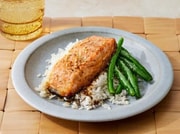Surviving the sizzle: what extreme heat does to your system—and 5 ways to protect yourself
- Replies 0
As July delivers its annual scorcher, many are left drained, foggy, and wondering how a sunny day could feel this brutal.
Heat may lift our moods at first, but as temperatures spike, the physical and mental toll becomes hard to ignore.
“When temperatures rise, the body tries to dissipate excessive heat,” says Dr. Alan Weiner, MD, from Stamford Health.
“This can take the form of sweating and breathing faster; heat is a stressor that makes it more difficult for us to exert ourselves.”
When we overheat, the body works harder to cool itself, forcing the heart to pump faster and increasing strain, adds Dr. Michael Hartman, PhD, vice president of research at Plexus Worldwide.
That cardiovascular stress can lead to dehydration, fatigue, and eventually heat exhaustion or even heatstroke.
Mentally, this strain often translates to brain fog, poor memory, and disrupted focus—especially in vulnerable groups like children, the elderly, and people with chronic illness.
Experts say protecting yourself from heat means more than just sunscreen—it's about proactive choices that help your entire system function in high temperatures.

Drink Water Continuously
It sounds simple, but most people don’t hydrate as well as they think. “Drink water continuously throughout the day and don't wait for thirst,” Dr. Hartman says.
When you’re sweating heavily, you’ll also need to replenish electrolytes, either with specialized drinks or water-rich foods like cucumbers, melons, and oranges. Consider making hydration part of your routine—not a reactive step after you’re already lightheaded.
Access Cooling Centers
If you don’t have reliable air conditioning, it’s important to find relief in public places. “Access cooling centers, libraries, or air-conditioned spaces for several hours daily,” Dr. Hartman recommends.
Even inside your own home, passive cooling helps: close blinds during peak sun hours, then ventilate overnight by opening windows. When possible, take cold showers to quickly lower core temperature.
Wear Loose, Light, and Long-Sleeved Clothing
Short sleeves aren’t always the smartest move. “Loose-fitting, light-colored, long-sleeved clothing made of natural fibers can be cooler than minimal clothing in direct sun by creating a barrier while allowing air circulation,” says Dr. Hartman.
Breathable fabrics like linen and cotton help maintain airflow while shielding the skin. Avoid dark, tight clothing that traps heat.
Consume Less Alcohol
While a cold drink might seem like a treat, moderation matters in the heat. “Alcohol impairs the body's ability to manage extreme temperatures,” warns Dr. Weiner.
On dangerously hot days, drinking alcohol increases your risk of dehydration and makes it harder for your body to regulate heat. Try rotating with seltzers, non-alcoholic cocktails, or just sticking to water if the mercury's rising fast.
Practice Sunlight Moderation
Even summer lovers need a break from direct sun. “At times of extreme heat, it is best to stay inside in an air-conditioned environment,” Dr. Weiner advises. If you plan to be outside, limit exposure to early mornings or post-sunset hours, and avoid prolonged periods in direct sun.
A wide-brimmed hat and frequent shade breaks aren’t just accessories—they’re tools for protecting your brain and body.
Read next:

Have you ever experienced heat-related brain fog or physical exhaustion? Tell us what worked—or didn’t work—for you in the comments below. Your tips might help someone else stay safe through the next heat wave.
Heat may lift our moods at first, but as temperatures spike, the physical and mental toll becomes hard to ignore.
“When temperatures rise, the body tries to dissipate excessive heat,” says Dr. Alan Weiner, MD, from Stamford Health.
“This can take the form of sweating and breathing faster; heat is a stressor that makes it more difficult for us to exert ourselves.”
When we overheat, the body works harder to cool itself, forcing the heart to pump faster and increasing strain, adds Dr. Michael Hartman, PhD, vice president of research at Plexus Worldwide.
That cardiovascular stress can lead to dehydration, fatigue, and eventually heat exhaustion or even heatstroke.
Mentally, this strain often translates to brain fog, poor memory, and disrupted focus—especially in vulnerable groups like children, the elderly, and people with chronic illness.
Experts say protecting yourself from heat means more than just sunscreen—it's about proactive choices that help your entire system function in high temperatures.

what extreme heat does to your system—and 5 ways to protect yourself. Image source: Jonas Weckschmied / Unsplash
Drink Water Continuously
It sounds simple, but most people don’t hydrate as well as they think. “Drink water continuously throughout the day and don't wait for thirst,” Dr. Hartman says.
When you’re sweating heavily, you’ll also need to replenish electrolytes, either with specialized drinks or water-rich foods like cucumbers, melons, and oranges. Consider making hydration part of your routine—not a reactive step after you’re already lightheaded.
Access Cooling Centers
If you don’t have reliable air conditioning, it’s important to find relief in public places. “Access cooling centers, libraries, or air-conditioned spaces for several hours daily,” Dr. Hartman recommends.
Even inside your own home, passive cooling helps: close blinds during peak sun hours, then ventilate overnight by opening windows. When possible, take cold showers to quickly lower core temperature.
Wear Loose, Light, and Long-Sleeved Clothing
Short sleeves aren’t always the smartest move. “Loose-fitting, light-colored, long-sleeved clothing made of natural fibers can be cooler than minimal clothing in direct sun by creating a barrier while allowing air circulation,” says Dr. Hartman.
Breathable fabrics like linen and cotton help maintain airflow while shielding the skin. Avoid dark, tight clothing that traps heat.
Consume Less Alcohol
While a cold drink might seem like a treat, moderation matters in the heat. “Alcohol impairs the body's ability to manage extreme temperatures,” warns Dr. Weiner.
On dangerously hot days, drinking alcohol increases your risk of dehydration and makes it harder for your body to regulate heat. Try rotating with seltzers, non-alcoholic cocktails, or just sticking to water if the mercury's rising fast.
Practice Sunlight Moderation
Even summer lovers need a break from direct sun. “At times of extreme heat, it is best to stay inside in an air-conditioned environment,” Dr. Weiner advises. If you plan to be outside, limit exposure to early mornings or post-sunset hours, and avoid prolonged periods in direct sun.
A wide-brimmed hat and frequent shade breaks aren’t just accessories—they’re tools for protecting your brain and body.
Read next:
- 23 ways summer vacations in the ’60s looked different from today
- 8 summer essentials from Dollar Tree for just $1.25 that shoppers can’t stop raving about
Key Takeaways
- Dr. Hartman emphasizes the importance of electrolyte balance, especially during periods of intense sweating.
- Natural fabrics like linen and cotton allow better airflow, helping your skin cool more efficiently in extreme temperatures.
- Alcohol interferes with both hydration levels and the function of common medications used to manage anxiety or depression.
- Public libraries, malls, and community centers often operate as cooling shelters during state-issued heat advisories.






